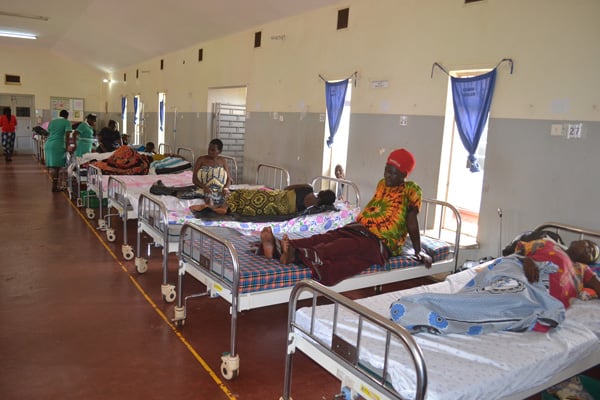Prime
Jinja mothers attend antenatal without coercion

Expectant mothers in their beds in Jinja Regional Referral Hospital in August 2019 . PHOTO/DENIS EDEMA
What you need to know:
- Ministry of Health said Uganda is working towards creating an environment where all mothers deliver in a health facility before a skilled midwife.
Village Health Team officials (VHTs) in Jinja City say they have gained significant ground over Traditional Birth Attendants (TBAs) in their efforts to promote antenatal services and safe deliveries among expectant mothers.
Ms Stella Okwi, a VHT attached to Budondo Health Centre IV, in Jinja North City Division, said lately, expectant mothers are attending antenatal services without any coercion.
“We tell them to come with their partners and subject them to a number of tests like HIV/Aids, and malaria, among others,” Ms Okwi said on Jul7 27.
She added: “We also tell them to prepare for the baby by saving some money and having contacts of boda boda so that in case labour starts, this expectant mother can be rushed to hospital or to health centre.”
According to Ms Okwi, some expectant mothers get miscarriages because they do not know their health status and ignore signs of malaria, and Urinary Tract Infections (UTIs), claiming they are “normal symptoms of pregnancy”.
Without sharing statistics and divulging further details, she said that is slowly changing.
In 2010, government banned TBAs, but did little to improve modern maternal health services in remote Uganda.
Ministry of Health spokesperson Emmanuel Ainebyoona said Uganda wants to create an environment where all mothers deliver in a health facility before a skilled midwife.
"The VHTs and Community Health workers will be a game change in enabling access and promotion of health services. Now, nine in ten pregnant women deliver at a health facility. We want 100 percent TBAs to have no place in this arrangement," he said.
Mr John Mugulusi Kanakulya, an employee at the facility called for massive sensitisation of women in the community, particularly in Budondo where he said majority of expectant mothers are teenagers.
The health facility has received an assortment of items including mosquito nets, Mama Kits, and reusable sanitary pads among others from the Rotary Clubs of Rubaga and Acacia Sunset, both based in Kampala City.
Monitor story brings more help
Budondo Village in Jinja North City Division continues to attract individuals and companies after a story of vulnerable girls using soil-made sanitary pads was published byMonitor in February 2024.
It was reported that girls in Buyala Village, Budondo Sub-county, Jinja City, were molding sanitary pads using soil as part of their menstrual hygiene routine.
All the girls did was pile soil in a polythene bag, fold it and pierce four holes to absorb the blood.
Following the story, several girls in Budondo Sub-county have been urged to stop keeping away from the community and schools during their menstruation.
Earlier, the Programme Manager Reach A Hand Uganda (RAHU), Ms Sheila Kasabiiti, said there were many misconceptions surrounding menstruation amongst the girl child due to lack of information.
“We have come to offer parents and the girl child skills on how to make reusable sanitary pads for their own, and to also demystify myths about menstruation,” Ms Kasabiiti said during the World Menstruation Day at Namizi Central Village, Namizi Ward, Jinja North City Division.
The annual event was attended by eight schools, including; Kyomya Primary School, King of Kings Senior Secondary School, Jinja Twins Primary School, Buwagi Primary School, Buyala Primary School, East Senior Secondary School, St Stephen Senior Secondary School-Budondo and Trinity College.
Ms Kasabiiti described as “very important” the need for the Girl Child and the community to have information on menstruation. She added that some parents do not share such information with their daughters, leaving them to use unhygienic materials that puts them at risk of contracting infections.

Pupils and students participate in making reusable sanitary pads provided by Reach A Hand Uganda (RAHU) during celebrations to mark World Menstruation Day in Budondo Village, Jinja North City Division in May 2024. PHOTO/DENIS EDEMA
Reach A Hand Uganda provided the girls with over 2,000 reusable sanitary packets, with four pads in each, which can be used for up to a year. The pupils and parents also participated in learning how to make the reusable sanitary pads using materials provided by RAHU.




